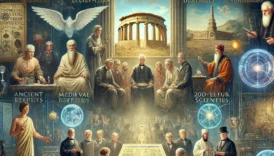The Conversation Between Iblis and Prophet Muhammad
This narrative, rooted in Islamic tradition, holds profound lessons for humanity. It recounts a remarkable interaction between Prophet Muhammad (PBUH) and Iblis (Satan), revealing insights into human weaknesses, Satan’s deceptive methods, and the importance of seeking refuge in Allah. This event is not just an anecdote but a moral compass for believers to understand the spiritual battles they face.
- The Conversation Between Iblis and Prophet Muhammad
- The Arrival of an Uninvited Guest: Iblis’s Entrance
- Iblis’s Obligation to Speak the Truth
- Iblis’s Hatred Toward Certain People
- The Power of Worship Against Satan
- 1. The Impact of Salah (Prayer):
- 2. The Power of Fasting:
- 3. The Strength of Charity (Sadaqah):
- 4. The Significance of Hajj:
- Satan’s Methods of Deception
- Iblis’s Children and Their Roles
- The Protected Ones: People of Sincerity
- The Ultimate Lesson: Seeking Refuge in Allah
Let us delve deeper into this story, examining its intricate details and profound meanings.
The Arrival of an Uninvited Guest: Iblis’s Entrance
One day, Prophet Muhammad (PBUH) was sitting with his companions at the house of an Ansari (a resident of Madinah). As they engaged in a meaningful discussion, a peculiar voice came from outside. The owner of the voice sought permission to enter. This interruption caught everyone’s attention, leaving them puzzled.
The Prophet (PBUH) turned to his companions and asked if they knew who the caller was. The companions, in unison, replied, “Allah and His Messenger know best.” The Prophet (PBUH) informed them that it was Iblis, Satan himself. He then granted permission for Iblis to enter, explaining that this was by Allah’s command and that Iblis was compelled to speak the truth.
When Iblis entered, the companions were struck by his horrifying appearance. He appeared as an aged figure, hideous in form, with a large head, bulging eyes, and lips resembling those of a camel. His grotesque figure reflected his inner corruption and malevolence.
Iblis’s Obligation to Speak the Truth
Iblis began by admitting that he was compelled to tell the truth during this conversation. Any falsehood would result in Allah’s wrath upon him. The Prophet (PBUH) asked a series of questions, and Iblis’s responses revealed his strategies for deceiving humans, the characteristics of people he despised, and the ways believers could protect themselves from his influence.
Iblis’s Hatred Toward Certain People
The Prophet (PBUH) asked Iblis who he despised the most among humans. His answers highlighted the qualities that repel Satan and strengthen one’s connection to Allah:
- Prophet Muhammad (PBUH):
Iblis declared his utmost hatred for the Prophet (PBUH), citing his role in guiding humanity to the truth and establishing Islam. The Prophet’s unwavering dedication to Allah made him Iblis’s greatest adversary. - Patient and Content Poor People:
Satan expressed his disdain for those who endure poverty with patience and do not complain about their condition. Such individuals frustrate Satan because their reliance on Allah shields them from his whispers. - Grateful Wealthy People:
Wealthy individuals who earn their riches lawfully and spend them in the path of Allah are also hated by Iblis. Their gratitude and generosity disrupt Satan’s attempts to incite greed and selfishness. - Just and Patient Individuals:
Iblis admitted that he could not influence those who exercise patience and act with justice. Their steadfastness and fairness make them impervious to his schemes.
The Power of Worship Against Satan
Iblis also detailed how various acts of worship weaken his influence and cause him great distress. These practices serve as powerful tools for believers to protect themselves:
1. The Impact of Salah (Prayer):
Salah is a direct connection between a believer and Allah. Iblis revealed that he trembles when a person begins their prayer, as it elevates the believer’s rank and distances them from Satan’s grasp. However, Iblis tries to distract worshippers by making them look around or lose focus during prayer.
2. The Power of Fasting:
Fasting binds Satan and limits his ability to influence a believer. The restraint and discipline required in fasting frustrate Iblis, rendering him powerless.
3. The Strength of Charity (Sadaqah):
Charity, according to Iblis, is one of the most effective acts against him. It purifies wealth, fosters love among people, and places a protective barrier between the giver and Hellfire. Iblis despises acts of generosity as they weaken his influence over people.
4. The Significance of Hajj:
Hajj, the pilgrimage to Mecca, drives Satan to madness. It is a culmination of worship and devotion, erasing sins and drawing believers closer to Allah.
Satan’s Methods of Deception
Iblis also explained the strategies he employs to lead humans astray. These methods underscore the subtlety and persistence of his schemes:
- Lying and Gossip:
Iblis thrives on lies and gossip, using them to sow discord and mistrust among people. He admitted that those who lie are his closest allies. - Delaying Salah:
Satan often whispers to people, urging them to delay their prayers with excuses such as “There is still time” or “Finish this task first.” This procrastination can lead to missing the prayer entirely, weakening one’s faith. - Pride and Vanity:
Iblis incites pride and vanity, encouraging individuals to boast about their achievements or perform acts of worship for show rather than sincerity. - Creating Division in Families:
Satan sows discord within families, leading to arguments, mistrust, and separation. These conflicts disrupt the harmony that Allah desires in households.
Iblis’s Children and Their Roles
The narrative mentions that Iblis has numerous offspring, each tasked with specific duties to mislead humanity:
- Betr: Responsible for causing people to abandon their prayers.
- Awar: Incites immorality and inappropriate relationships between men and women.
- Zalnabur: Encourages deceit and dishonesty in marketplaces.
- Dasim: Stirs conflict and disharmony within families.
These offspring work tirelessly to execute Iblis’s agenda and spread corruption.
The Protected Ones: People of Sincerity
Iblis admitted that he could not influence those who possess sincerity (ikhlas). These individuals worship Allah purely for His sake, free from pride, vanity, or attachment to worldly desires. Their hearts are solely dedicated to Allah, making them immune to Satan’s whispers.
The Ultimate Lesson: Seeking Refuge in Allah
This conversation between Iblis and the Prophet (PBUH) serves as a timeless reminder of the spiritual struggle every believer faces. It underscores the need for vigilance against Satan’s deceptions and the importance of seeking refuge in Allah through worship, patience, and sincerity.
The Quran emphasizes this point:
“Indeed, Satan has no authority over those who believe and rely upon their Lord.” (Surah An-Nahl, 99)
Believers are reminded to remain steadfast in their faith, perform their obligations sincerely, and seek protection from Allah against the constant threat of Satan. By understanding the methods and objectives of Iblis, they can strengthen their defenses and live a life that pleases Allah.
This narrative is more than a story; it is a guide for navigating the challenges of life with faith and resilience. May Allah protect us all from Satan’s influence and grant us the strength to remain steadfast on the path of righteousness.





